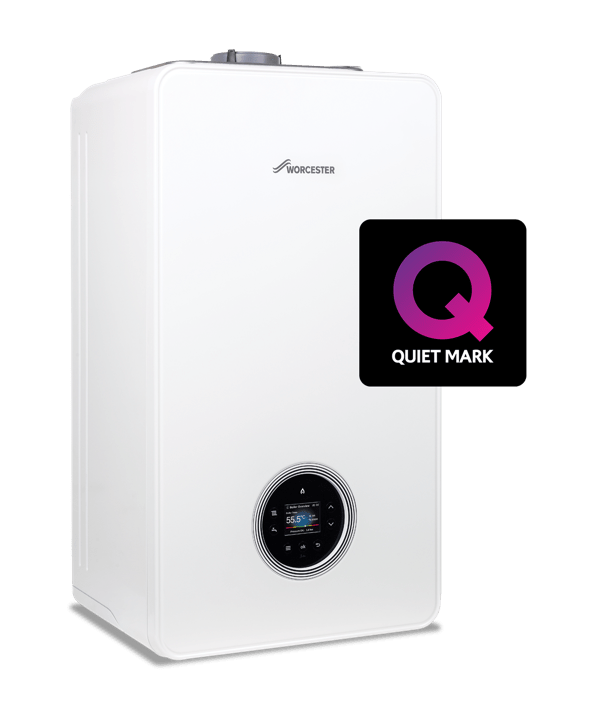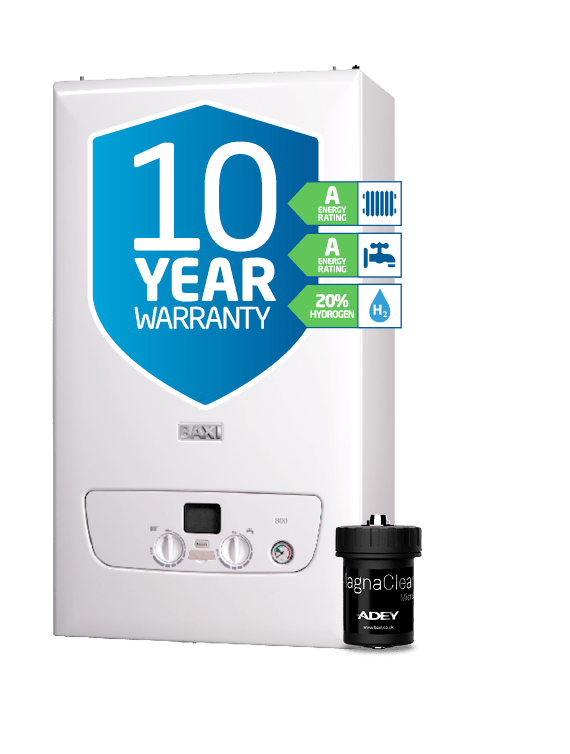What is a condensing boiler?

A condensing boiler features condensing technology that uses the heat that it generates to be more efficient and then these gasses are released via a flue, which usually sticks out of an external wall of your property.
Get a fixed price online in 20 seconds – Click here
By using the latest technology, boilers can work at over 90% efficiency easily to help keep costs down. In terms of costs, this means that for every £10 spent on gas, only £1 of it is lost in the heating process. Find out now about gas condensing boiler
Fixed Price Boiler Quotes Online
Get the best boiler deals, fitted next day if ordered before 2pm weekdays!
How does a condensing boiler work?
So, what is a condensing boiler? If a central heating system or boiler of any type is fitted with a Flue Gas Recovery System it is condensing.

In a nutshell just to simplify that you can buy a condensing combi boiler which has a flue and therefore has a condensate pipe component.
The condensing part of the boiler helps the boiler’s heating efficiency, and the environment and reduces energy bills.
A boiler with no flue would be a non-condensing boiler.
The condenser in the boiler and the condensate pipe gets rid of the boiler condensation/wastewater and during the colder months a frozen condensate pipe is often the cause for a boiler not working.
See how to fix a frozen condensate pipe here to get your boiler back up and running freezing weather.
Are all boilers condensing?
If you have an old boiler over 15 years old, you may have a non-condensing boiler or a back boiler.

However, as part of the boiler plus scheme, all new boilers in the UK have to have condensing technology now to ensure maximum energy efficiency. If you have an old boiler
The main types of gas or oil boilers are combi boilers, system boilers, or regular boilers.
The purpose of a condensing boiler is to generate more heat from waste gases which would be lost with any boiler that doesn’t feature a flue. Condensing makes heating rather than wasting heat.
Waste gases are produced as the boiler operates and then exited out into the atmosphere, that heat would then be lost.
However, a condensing boiler has 2 internal heat exchangers which catch and then reuse this heat. This enables condensing boilers to reach high efficiencies of over 90%.
Fixed Price Boiler Quotes Online
Get the best boiler deals, fitted next day if ordered before 2pm weekdays!
How do I know if my boiler is condensing?
You can tell if you have a condensing boiler or non-condensing boilers by having a look if there is a plastic pipe (condensate pipe) sticking out of an external wall, this would be where the boiler is installed and leads waste to the drain.
If your central heating system has an ErP rating then you also know your boiler is condensing. This rating is given for the high efficiency units.
Most boilers installed after April 2005 have a condensing unit, this is because a regulation came into place by that date.
What are the advantages of a condensing boiler?
The advantages list of installing a condensing boiler is extremely long, from reducing energy bills, making your home more efficient and helping the planet.
Environmentally friendly
High-efficiency condensing boilers produce less CO2 emissions making them more environmentally friendly.
Yearly a condensing gas boiler could save up to 1.8 tons of carbon dioxide that would otherwise exit into the atmosphere.
Energy efficient
Condensing heating systems are around 30% more energy efficient than non-condensing boilers.
They can reach massive efficiencies of over 90%.
To understand efficiency ratings, compare them to:
100% represents every £1 being spent on your energy bills. Every percentage under that being a penny lost.
Lower fuel bills
Higher efficiency means lower energy bills.
This is due to burning less fuel to make the same amount of energy required.
Yes you read that correct, you could be making an investment with this feature.
Size
High-efficiency best combi boilers are easy on the eye, small compact units which can fit in a kitchen cupboard.
What are the disadvantages of a Condensing boiler?
The condensate pipe which is a component of the boiler flue has the job of discharging waste into the drains.
With the pipe been outside it is possible freezing can happen in the colder months. You may have to de-ice the frozen condensate pipe with hot water or by applying a warm cloth or hot water bottle.
Due to the steam produced by the waste pipe, the placement of the boiler has to be carefully planned, meaning less flexibility.
When fitting a new condensing boiler a power flush may be required. This would be added as an extra cost.
In order to ensure the convection flow of exhaust gases a fan is required. This adds to the complexity of your boilers mechanisms and installation.
If you are noticing any strange noises or any problems with your condenser boiler ensure you call a Gas Safe registered engineer as soon as possible.
What are the Condensing boiler regulations?
April 2018 a new regulation came into place which states that new gas boilers must have an ErP efficiency rating of at least 92%.
A series of regulations were introduced by the government in 2010, to help reduce the (flue gases) carbon footprint CO2 emissions produced by non-condensing boilers.
April 1st 2005 all gas boilers must be condensing, both new boiler installations and replacements..
April 1st 2007 all oil fired boilers have to be condensing, both new boiler installations and replacements.
There are some exceptions to the condensing boiler regulations should it be considered too difficult or costly to replace an old non-condensing unit with a condensing boiler.
An assessment must be carried out by a Gas Safe registered engineer who will provide a certificate as proof that the work has undergone.
Installing a Condensing Boiler
Installation of a boiler that is a condensing combi boiler system is a fairly simple procedure, depending on your home set up and boiler position.
The size of your condensing boilers unit will depend on the size of your home as well as the amount of heating and hot water you will require for the boiler installation in your home.
- Whether you want a wall hung boiler or a cupboard boiler. Both options are personal preference and depend on your home set up.
- it is preferable to have the unit installed near a drain for wastage water.
- Planning permission may be needed if the flue extends above the roof by over a metre.
Gas Safe Registered engineer information:
Always use a Gas Safe Registered engineer to ensure a safe and efficient installation is carried out.
Having a yearly service with the manufacturers recommend engineer keeps your warranty valid.
Key tip : You can check whether your engineer is on the gas safe register by asking to see his identity card. All registered engineers must carry this with them at all times.
Hiring an unqualified engineer to replace your boiler could be extremely dangerous.
What is the Best condensing boiler?
The main modern manufacturers of condensing boilers we recommend are: Worcester Bosch boilers, Viessmann boilers, Ideal boilers, Glow worm boilers, Vailliant boilers and Baxi boilers.
Whether you’re looking for a combi boiler, regular or system boiler a condensing unit is offered by all the above manufacturers.
Once you’ve found the condensing boiler to suit your home, you’ll need a qualified Gas Safe registered engineer to carry out the installation.
The installation cost won’t be added into the price of the boiler and all installers charge differently so to help you get the best deal, we recommend comparing quotes from several engineers.
By going to our Green Central website you can compare boiler quotes.
Fixed Price Boiler Quotes Online
Get the best boiler deals, fitted next day if ordered before 2pm weekdays!




